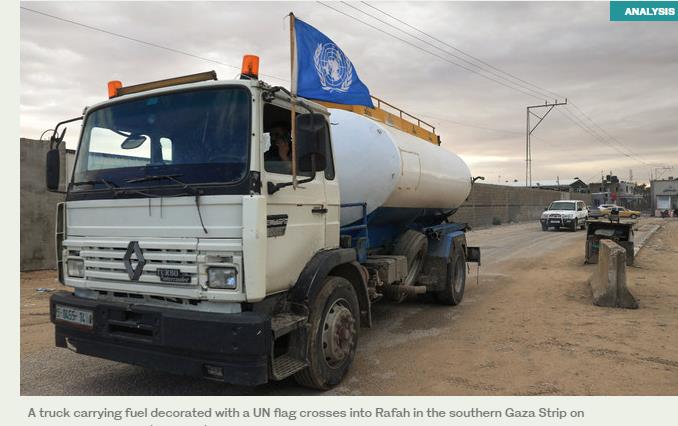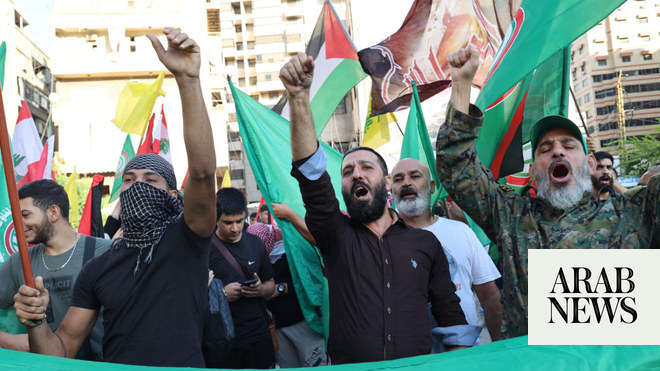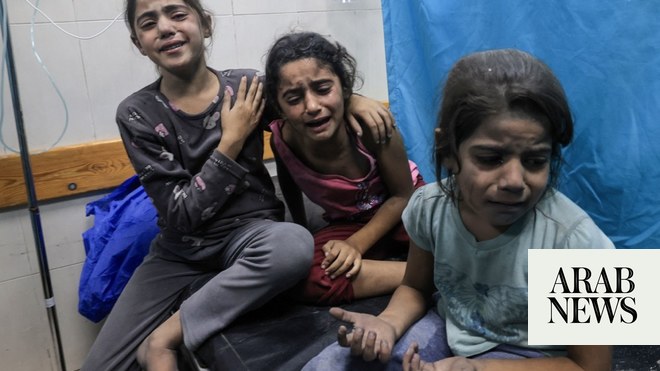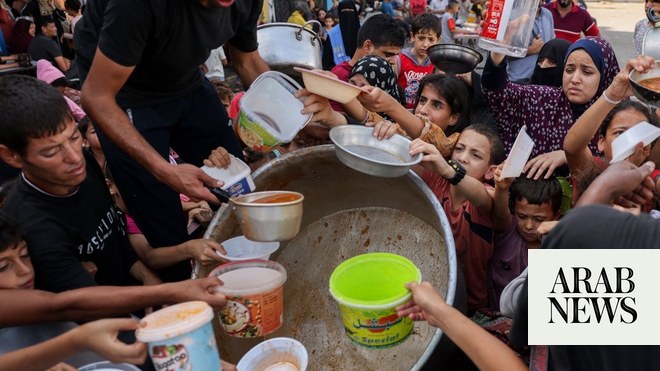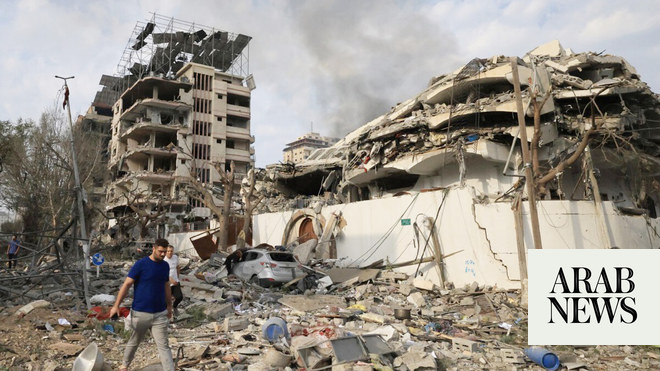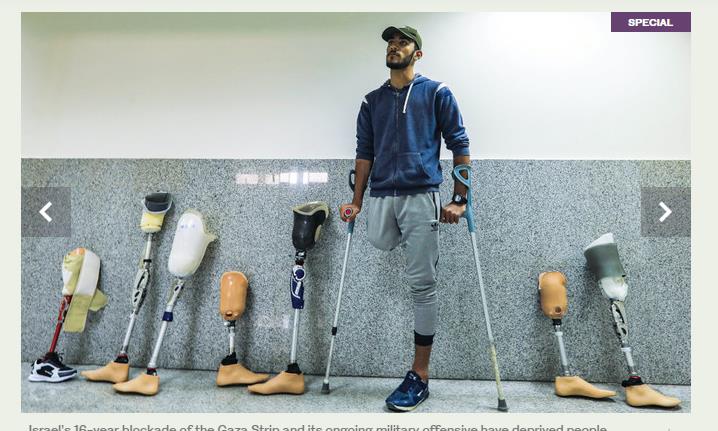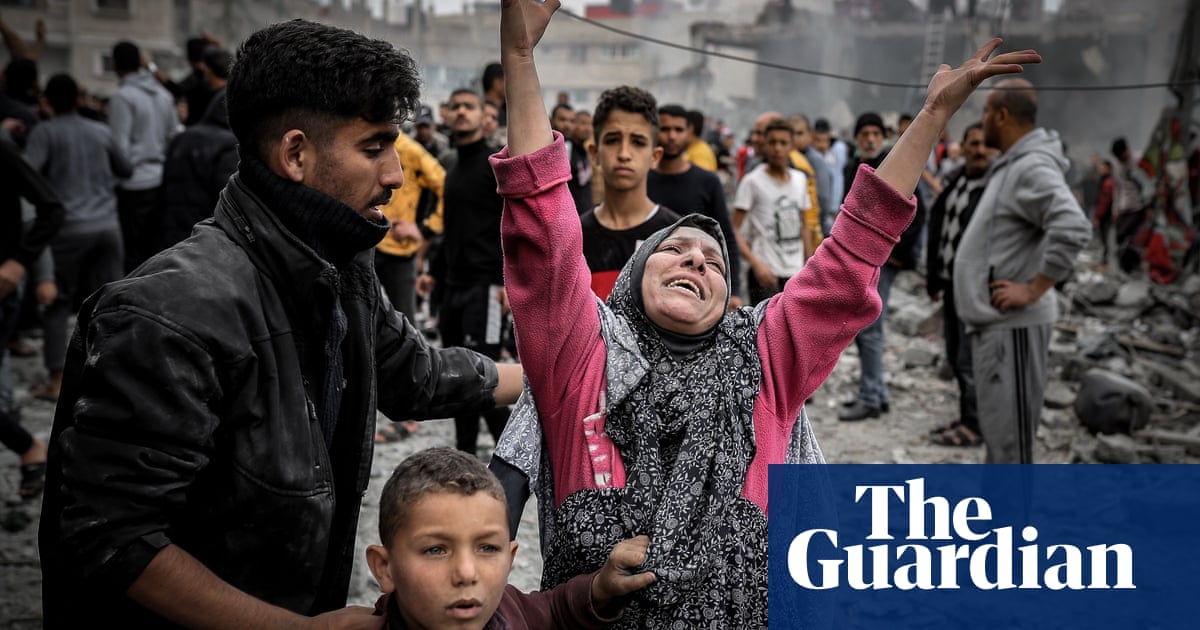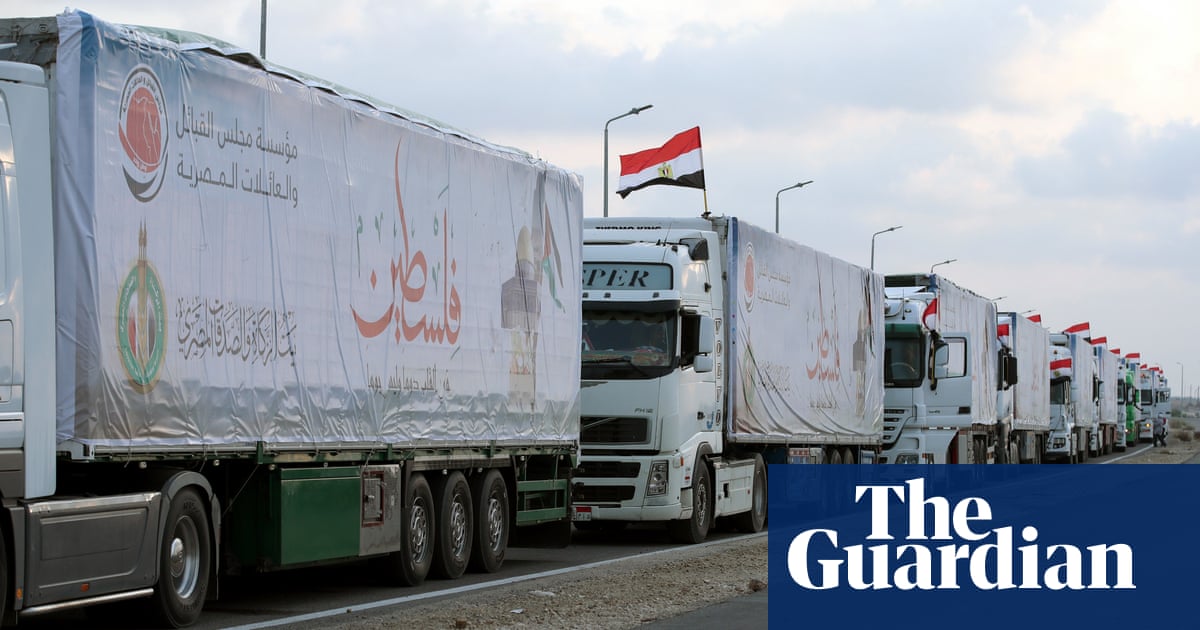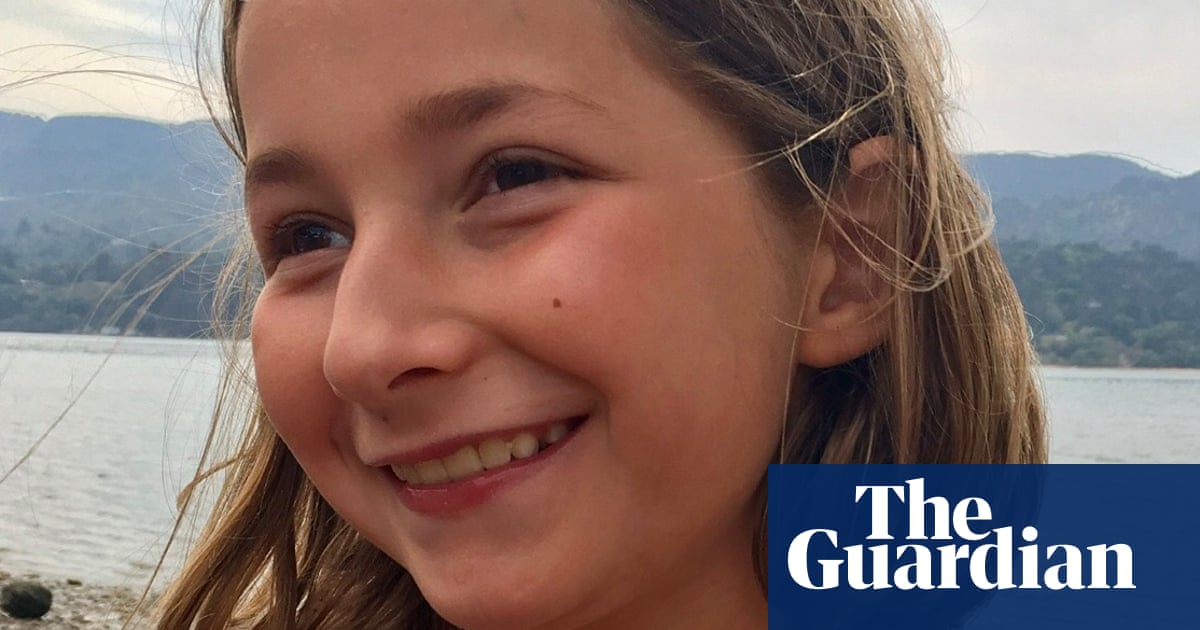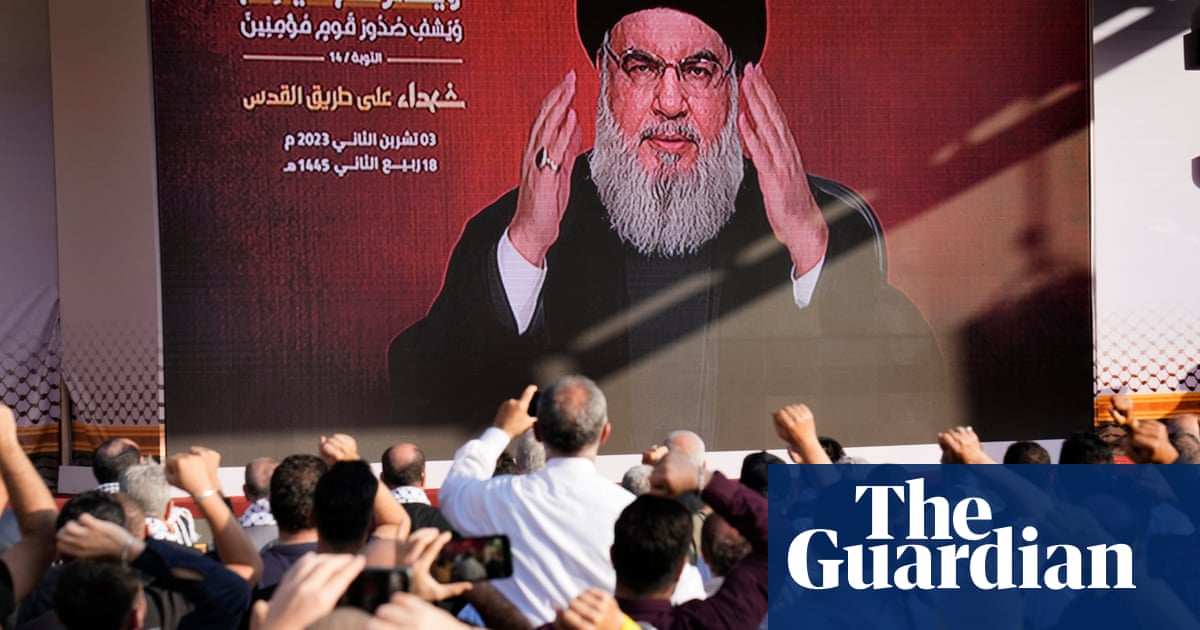
Good morning. It’s been another remorseless weekend for the people of Gaza. On Saturday night, an Israeli air strike at the Al-Maghazi refugee camp killed at least 45 people, the Hamas-run health ministry claimed, while the head of the Al-Aqsa hospital put the toll at 52; Israel says it is investigating the incident. And late on Sunday, a series of huge explosions lit up the sky over the territory – strikes which Israeli media reports suggested were a precursor to an advance on Gaza City within the next 48 hours.
About 120 miles north, exchanges across Israel’s border with Lebanon continued at a much lower intensity – but with a momentum of their own. Lebanese state media said that three children and their grandmother were killed in an Israeli air strike, an incident that prompted retaliatory rocket strikes on the northern Israeli town of Kiryat Shmona. Those ongoing border skirmishes have fuelled fears of a new front involving a far more powerful regional actor than Hamas: Hezbollah.
Hezbollah’s leader, Hassan Nasrallah, gave a speech on Friday which seemed to fall short of a threat of imminent escalation – but incidents like yesterday’s suggest how events could spin out of control. If that were to happen, it would come with a risk of a wider conflict drawing in Iran and the United States. For today’s newsletter, I spoke with the Guardian’s Peter Beaumont, who has been reporting from the border, about what to take from Nasrallah’s speech, and the risks of a new front in the war opening up – even if nobody wants it to.
PS: Your eagle eyes will have noticed a change in your inbox today: I’m back after parental leave, considerably more expert in nappies and night feeds than when I last wrote to you. Huge thanks to Nimo and the indefatigable roster of writers who picked up the slack while I was gone. Here are the headlines.
Five big stories
King’s speech | Rishi Sunak will this week announce legislation for a new annual system for awarding oil and gas licences as part of a highly political king’s speech which the Conservatives hope will open up clear dividing lines with Labour. The government, which has already watered down the UK’s climate targets, said the plans would protect jobs and bolster energy security.
Poverty | Poverty levels in the UK are “simply not acceptable” and the government is violating international law, the United Nations’ poverty envoy has said ahead of a visit to the country this week. Olivier De Schutter told the Guardian that “things have got worse” since his predecessor Philip Alston angered the government with criticism on his own visit in 2019.
Ukraine | Volodymyr Zelenskiy has denied a claim from the Ukrainian military’s commander-in-chief that the war with Russia has reached a stalemate. Gen Valerii Zaluzhnyi said the war had entered an attritional phase and suggested Russia was slowly gaining the upper hand.
Conservatives | Oliver Dowden, the deputy prime minister, has denied that rape allegations against a Conservative MP were “covered up” during his time running the party’s headquarters. It follows reports in the Mail on Sunday that allegations against an MP were not dealt with properly by the party, allowing the politician to continue offending.
Israel-Hamas war | The parents-in-law of Scotland’s first minister, Humza Yousaf, have arrived safely in Scotland after fleeing the conflict in Gaza. Yousaf shared a family photo of his wife, Nadia, and her parents, Elizabeth and Maged El-Nakla, who were among 92 British nationals permitted to pass through the Rafah border crossing into Egypt on Friday morning.
In depth: The role Hezbollah could play in escalating conflict in the Middle East
Hezbollah – which means “party of God” – was founded by a group of radical Shia clerics in 1982, with Iranian backing from the beginning, and is designated as a terrorist group by the US, UK and Israel, among others. It is devoted to the expulsion of western powers from the Middle East, and rejects Israel’s right to exist. In this explainer, Jason Burke notes that it is viewed as a pioneer of mass casualty suicide attacks. But it is also a key player in Lebanon’s government, and controls many Shia-majority areas of the country, particularly in the south, near the Israeli border.
Analysts point to Iran’s influence over Hezbollah as a key determinant of its strategy in all of its actions against Israel: like Hamas, Hezbollah is trained, funded and supplied by Iran’s Islamic Revolutionary Guards Corps. Lina Khatib, director of the Soas Middle East Institute, writes: “Neither Hamas nor Hezbollah take decisions to declare war or peace without explicit prior agreement from Iran.”
Nonetheless, analysts note that Hamas and Hezbollah do not have identical agendas: indeed, they were profoundly split during the Syrian civil war, when Hamas backed the rebels while Hezbollah sided with Bashar al-Assad. Hezbollah is a far better equipped force than Hamas, with loftier regional ambitions. And partly because Iran and Hezbollah both adhere to Shia Islam – unlike Hamas, which is Sunni – they are much more closely aligned.
“The fact is that regardless of what happened on 7 October and what’s happened since in the south, the biggest perceived threat to Israel is from Hezbollah,” Peter Beaumont said. “You have to ask yourself: if Israel says it can’t live with the threat of Hamas, what does that suggest about future security questions about Hezbollah? I don’t know what the answer is, but the question is clearly being asked.”
How has Hezbollah reacted since 7 October?
Ever since Hamas attacked southern Israel, there have been intensified cross-border exchanges in the north of the country that have fallen short of a cause for escalation. An increase in rocket attacks has led to the evacuation of Israeli civilians living very close to the Lebanese border, and the internal displacement of more than 25,000 people in Lebanon, according to the International Organisation for Migration. Before yesterday’s exchanges, Israel said that six of its soldiers have been killed, as well as one civilian, while Hezbollah has announced the deaths of 61 of its fighters.
But both sides have so far stuck to the “undeclared rules of engagement whereby neither side sparks a new war”, Khatib wrote. Hezbollah has hit military posts and targets that it views as Lebanese territory under Israeli occupation, while Israel has bombed Hezbollah-connected targets within 3km of the border.
Nonetheless, the range of attacks has crept upwards in the weeks since 7 October, and with that comes fear of a chain of events that could lead to an all-out conflict. With Hezbollah chief Hassan Nasrallah conspicuously silent since the original Hamas attack until Friday, there have been fears his organisation could be biding its time, and preparing to respond once an Israeli ground invasion of Gaza is fully under way.
What did Nasrallah say on Friday?
When Nasrallah finally broke his silence with a speech shown on large screens across Lebanon on Friday, he praised the 7 October attack estimated to have killed more than 1,400 Israelis and taken hundreds as hostages as “a greatly successful” operation that had exposed “the frailty, weakness and total fragility of Israel … it’s more fragile than a spider’s web”. He also suggested that Hezbollah retained the option of expanding its cross-border attacks “at any time”. But he stopped short of any declaration of war – and emphasised that the Hamas attack had been carried out without Hezbollah’s knowledge.
Peter is cautious of any interpretation that treats Nasrallah’s speech as a cause for relief. “Understanding the messaging is not straightforward,” he said. “I think it’s still an open question what Hezbollah will do. As they play this game of incremental escalation, all it would take is a strike that kills X number – and we don’t know what that number is – for the logic of the situation to no longer be under control. And as Nasrallah does this very careful tightrope walk, that doesn’t mean that other people in the organisation wouldn’t prefer to be more proactive.”
Could there be an escalation on the Israel-Lebanon border?
Nasrallah certainly wants the world to fear the prospect – and on Saturday, Hezbollah fired a powerful missile of a type not used since 7 October. The reported deaths of three children and their grandmother in an Israeli attack, and Hezbollah’s retaliation, might also be seen as the kind of event that could have a domino effect – though there has been no sharp escalation in response as yet, with the frontier town of Kiryat Shmona that was hit in response now largely deserted. (Peter and Quique Kierszenbaum sent this vivid dispatch from the area last week.)
There is no doubt that Hezbollah has the firepower to considerably expand its operations: it is estimated to have an arsenal of about 150,000 missiles and rockets, and while most of those are “dumb” weapons with a range of a few dozen kilometres, some are precision guided, with the ability to reach far into the Israeli interior. “If something serious is fired at a population centre like Haifa, all bets would be off,” Peter said.
There are factors weighing against such an escalation. Hezbollah is unpopular in Lebanon outside its Shia power base because of a perception that it is prepared to unilaterally drag the country into war, and Israel has warned that it would not distinguish between Hezbollah territory and the rest of the country in any response. Israel says that it has plenty of forces held in reserve for any confrontation with Hezbollah. The arrival of two US carrier groups in the Mediterranean is a further reason for Hezbollah to fear the consequences of a larger conflict.
Despite all that, events of the last month have injected a new kind of uncertainty into Israel’s security calculations. “It would be naive, after 7 October, to trust that what’s happening in the north is nasty but under control,” Peter said. “Everyone missed the buildup to Hamas’s attack. It would be terribly complacent to assume this is going to stay as it is at the moment.”
Would any escalation lead to a wider war?
Much of the diplomatic effort in the aftermath of the 7 October attack has been driven by fears that – even if none of the players are immediately seeking such an outcome – a war between Hezbollah and Israel could escalate rapidly. The US would probably feel bound to support Israel if that happened, fearing that the deterrent value of its forces in the region would be lost if it turns out to be bluffing. Iran, too, says that it does not want a wider war and insists it does not control Hezbollah, but has warned that “the probable spread of war in other fronts is approaching an unavoidable stage”.
Iran’s leverage over Hezbollah, the US deterrent, Israel’s strategic desire to focus on Gaza, and Hezbollah’s fears for its own destruction all might be seen as mitigating against a new front opening up, at least for now. But if Hezbollah or Israel feel that a red line is crossed by the other side, that doesn’t mean it might not happen anyway.
What else we’ve been reading
Buses generally are not the most exciting mode of transportation: they can be slow, a bit gross and at times inconvenient. These Guardian readers disagree, and have shared their tips for some of the most picturesque and fun bus rides in the country (one even goes on a boat). Nimo
As new guidelines state HRT should not be prescribed to menopausal women who are experiencing symptoms of depression despite many women saying it helps, Emma Beddington writes here about the misconceptions regarding menopause – and calls for more research to be done to stop the confusion and misinformation around the condition. Nyima Jobe, newsletters team
Garth Cartwright’s interview with jazz legend Ron Carter is a must read. Now 86, Carter has played on more than 2,000 albums and continues to make music. The pair discuss his musical dalliances with everyone from Miles Davis to Aretha Franklin. Nimo
Bojan Krkic, once Barcelona’s next great wonderkid, has opened up about his career-long battle with anxiety. In an interview with Sid Lowe, Krkic talks about how he now works to help the next footballing generation deal with the stigma that surrounds mental health. Nyima
Dr Roxy was a plastic surgeon who rocketed to TikTok fame after she uploaded videos of her performing surgeries on patients. Her platform was growing rapidly, until people came forward with horror stories from bowel punctures to breast bleeding. Judith Newman has written for New York Magazine (£) on Roxy’s record of botched surgeries. Nimo
Sport
Football | Liverpool salvaged a 1-1 draw at Luton thanks to a 95th-minute equaliser from Luis Díaz (above), who celebrated by showing a T-shirt appealing for his father’s safety – he was kidnapped in Colombia earlier this week. Meanwhile, Nottingham Forest beat fifth-placed Aston Villa 2-0 thanks to goals from Ola Aina and Orel Mangala. In the WSL, Stina Blackstenius’s late winner was enough to secure Arsenal a 2-1 victory over Manchester City.
Cricket World Cup | India’s Virat Kohli scored his 49th one-day international century, equalling Sachin Tendulkar’s ODI record, as India demolished South Africa to reinforce their status as tournament favourites. After India scored 327 in their innings, South Africa were bowled out for just 83.
Formula One | Max Verstappen won the São Paulo Grand Prix, beating Lando Norris into second place as Fernando Alonso pipped Sergio Pérez for third. Verstappen dominated the race from beginning to end, while Mercedes’ Lewis Hamilton finished eighth.
The front pages
“Israeli strikes on Gaza intensify as violence on Lebanon border flares” – the Guardian’s front-page lead this Monday morning. The Times says “Israel steps up assault on Hamas” while the Daily Telegraph’s concerns about the Gaza war are closer to home: “Met chief urged to ban Armistice Day protest”. “Show some respect” – the Sun says there is “fury over marches” and demands the police “protect poppy day services”. “Hands off cenotaph” says the Metro, calling it a “remembrance warning” from Suella Braverman. The i has “UK’s national security council ‘not prepared for heightened terror threat’”. “Saving lives in hell” – the Daily Mirror has the story of a British doctor who got out of Gaza. “Brexit trade freedom ‘boost’ for UK economy” – that’s the ever-leavin’ Daily Express, in case you didn’t guess. The Daily Mail has “Pressure on Tories over ‘serial rapist’ cover-up”. Top story in the Financial Times is “Sunak to unveil bill for new licences to drill more North Sea oil and gas”.
Today in Focus
Why are Britain’s new homes so rubbish?
Oliver Wainwright reports on the increasingly poor standards of newly built homes in the UK and what consumers can do to protect themselves.
Cartoon of the day | Edith Pritchett
Sign up for Inside Saturday to see more of Edith Pritchett’s cartoons, the best Saturday magazine content and an exclusive look behind the scenes
The Upside
A bit of good news to remind you that the world’s not all bad
Who says you have to stay in one career for the rest of your life? Meet Morag Chisholm, who at 80 is on her fourth career … and she’s only getting started. From sailor, to accountant, to goat breeder, Chisholm is a relationship counsellor working for Relationships Scotland.
For the Guardian’s New start after 60 column, Chisholm says that keeping her life varied makes her extremely calm and compassionate which helps with her day job as a counsellor. After four marriages, bereavement and divorce, she says her new venture has taught her the value she holds. “I have something to give, and it is appreciated, and I really appreciate people thinking that, that has helped me to enrich my life.”
Sign up here for a weekly roundup of The Upside, sent to you every Sunday
Bored at work?
And finally, the Guardian’s puzzles are here to keep you entertained throughout the day – with plenty more on the Guardian’s Puzzles app for iOS and Android. Until tomorrow.
Quick crossword
Cryptic crossword
Wordiply




